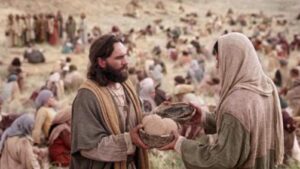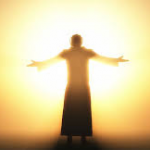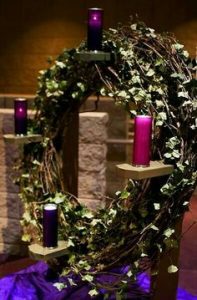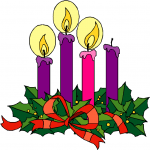“In the desert (where this crowd was gathered) people of faith are needed who, by the example of their own lives keep hope alive.”
(Pope Francis)
These last few Sundays we’ve heard a variety of Jesus’ parables that were significant enough to Matthew to include them in his Gospel. But, do you realize that this is the only story that is mentioned by all four gospel writers? And, it is not really a story-parable that Jesus taught. It’s a real-live incident; a parable in action; a how-to model or a hillside “Show and Tell.” You’ll notice that Matthew doesn’t start today with “Jesus sat down and began to teach” or “Jesus proclaimed to the crowds.” Matthew says that Jesus withdrew by boat to try and find a quiet place. We can sympathize with him; he had just learned of the death of his cousin John. But, when he went ashore, movement attracted his attention. Looking around he saw the crowds had followed him. Many of them probably knew John too. And, apparently many in the crowd knew the whereabouts of this “quiet place” and were there to greet Jesus. Foregoing His quiet time, moved with pity, Jesus walked among them, curing the sick and listening to their pleas as they reached to touch him (the hem of his garment); maybe get a quick “high five” from their beloved Teacher.
 When the day was getting long, His disciples told him the obvious. “They’re hungry.” Jesus responds “Well, do something about it – Feed them.” Which is the same thing He is telling us. We are likely to reply, as did His disciples, “All we’ve got are five measly hoagie buns and two fish. What good is that in the face of all that’re to be fed?”
When the day was getting long, His disciples told him the obvious. “They’re hungry.” Jesus responds “Well, do something about it – Feed them.” Which is the same thing He is telling us. We are likely to reply, as did His disciples, “All we’ve got are five measly hoagie buns and two fish. What good is that in the face of all that’re to be fed?”
But at Jesus’ word, swallowing any doubts, the disciples and their helpers trusted that they would not be embarrassed by scarcity and that the people’s hunger would be satisfied. Would we have done the same or would we have figured “there’s not enough for everyone, so let’s not start a frenzy!”
Pope Francis reminds us: “In the desert (where this crowd was gathered) people of faith are needed who, by the example of their own lives keep hope alive.” Hope rose on that day as what was in those picnic baskets fed family after family. Wasn’t the miracle that faith and good example prompted everyone who had even the smallest picnic in their basket to share it with their neighbors? Is that not why 5 loaves and 2 fish became a banquet – with 12 baskets of left-overs for another day? [Remember this when we have an “ice box review” meal.]
Today we are blessed with material progress, and the generosity of our donors, beyond anything that our deceased Sisters and our parents could ever have imagined. Face it: emotionally and spiritually, people are still hungry and thirsty. This COVID situation prompts us, (thankfully, like many others), to make phone calls, share what we have, send e-blasts and web posts, write letters and listen patiently to the same stories of families’ sorrow and grief over illness and death. It takes the “pity of Jesus” to listen attentively to others repeat the news we’ve already heard – maybe more than once or twice.
But, we’ve pledge to do just that – with the compassion of Christ. That’s a tall order. If we are to have something to share, we must also take seriously Jesus’ invitation to be fed by Him, especially in the Eucharistic feast. Likewise, to seek a quiet place to converse with Him. We can only fill the hungry crowd if we seek the Lord in Lectio, communal prayer and quiet times of reflection and conversation with the One we pledge to imitate.
We are moved to ask ourselves: “What really sustains me? What is my true sustenance? For, if I am living in a desert – a state of spiritual starvation – I will come up clueless when Jesus tells me, “Feed the people yourself.” As the saying goes: you can’t give what you ain’t got! Imagine yourself seated on the grass that day, and being part of this miracle where 5,000 or so people were fed from food barely enough for one family. If you received physical sustenance from that bread and fish miraculously multiplied by Jesus, and the example of trust of the disciples, and the generosity of the crowd, would you ever be the same again? Could you ever eat any meal in the same way?









